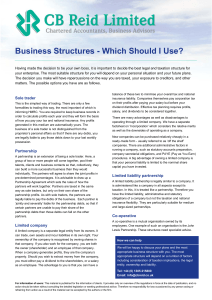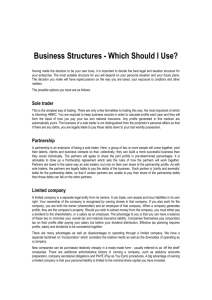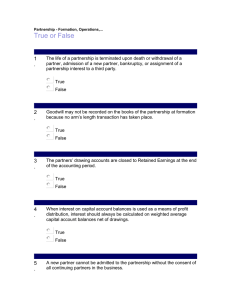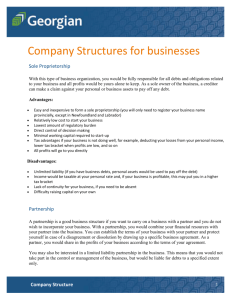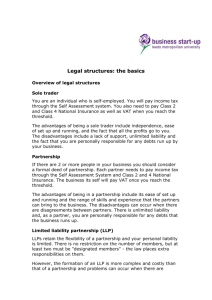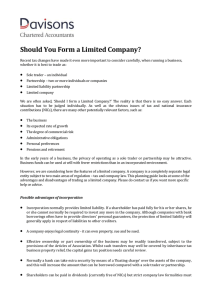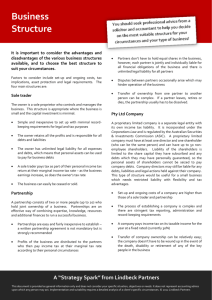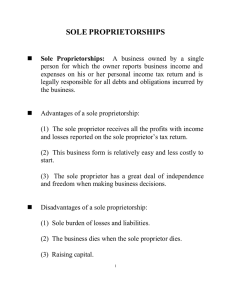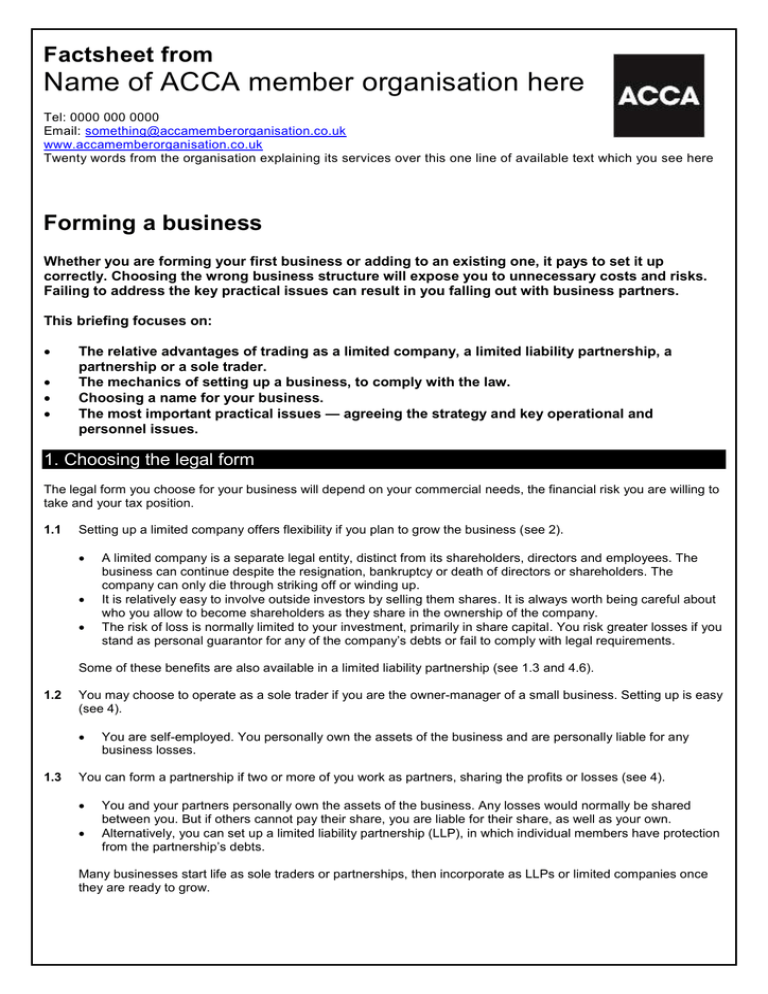
Factsheet from
Name of ACCA member organisation here
Tel: 0000 000 0000
Email: something@accamemberorganisation.co.uk
www.accamemberorganisation.co.uk
Twenty words from the organisation explaining its services over this one line of available text which you see here
Forming a business
Whether you are forming your first business or adding to an existing one, it pays to set it up
correctly. Choosing the wrong business structure will expose you to unnecessary costs and risks.
Failing to address the key practical issues can result in you falling out with business partners.
This briefing focuses on:
The relative advantages of trading as a limited company, a limited liability partnership, a
partnership or a sole trader.
The mechanics of setting up a business, to comply with the law.
Choosing a name for your business.
The most important practical issues — agreeing the strategy and key operational and
personnel issues.
1. Choosing the legal form
The legal form you choose for your business will depend on your commercial needs, the financial risk you are willing to
take and your tax position.
1.1
Setting up a limited company offers flexibility if you plan to grow the business (see 2).
A limited company is a separate legal entity, distinct from its shareholders, directors and employees. The
business can continue despite the resignation, bankruptcy or death of directors or shareholders. The
company can only die through striking off or winding up.
It is relatively easy to involve outside investors by selling them shares. It is always worth being careful about
who you allow to become shareholders as they share in the ownership of the company.
The risk of loss is normally limited to your investment, primarily in share capital. You risk greater losses if you
stand as personal guarantor for any of the company’s debts or fail to comply with legal requirements.
Some of these benefits are also available in a limited liability partnership (see 1.3 and 4.6).
1.2
You may choose to operate as a sole trader if you are the owner-manager of a small business. Setting up is easy
(see 4).
1.3
You are self-employed. You personally own the assets of the business and are personally liable for any
business losses.
You can form a partnership if two or more of you work as partners, sharing the profits or losses (see 4).
You and your partners personally own the assets of the business. Any losses would normally be shared
between you. But if others cannot pay their share, you are liable for their share, as well as your own.
Alternatively, you can set up a limited liability partnership (LLP), in which individual members have protection
from the partnership’s debts.
Many businesses start life as sole traders or partnerships, then incorporate as LLPs or limited companies once
they are ready to grow.
2. Limited company
Trading as a limited company can be a good way of limiting the risks of personal financial loss.
2.1
Your liability is normally limited to the amount you agree to invest in the company by buying its shares.
If your business goes into liquidation owing money, the creditors are paid out of the sale of the assets of the
company.
The creditors might include suppliers, employees, your bank or HM Revenue & Customs (HMRC).
2.2
You can raise money for the business by selling shares in the company to interested parties, including other
businesses.
2.3
Directors and other employees pay income tax on salaries and benefits through PAYE.
You must submit annual accounts and tax returns to HMRC, and file a set of accounts with Companies House to
make information on the company’s finances publicly available. There are fines if you miss deadlines or submit
incorrect information.
2.5
You may wish to tie in key managers by offering them a stake in the business.
Limited companies pay corporation tax on their profits.
2.4
Under normal circumstances, creditors have no legal right to obtain repayment from the directors or other
shareholders of the business. The debts of the company should not affect the directors’ personal credit
ratings.
Most small companies with a turnover of no more than £6.5 million do not need to have their accounts fully
audited and so are not required to appoint an auditor.
There are a number of other statutory requirements that you must fulfil on an annual or ongoing basis.
For example, you must let Companies House know about any change of directors.
3. Becoming limited
3.1
You can set up a new limited company with minimal effort using a company registration agent, or your
accountant or solicitor.
Check whether the agent you use is known and reputable.
Most agents can also provide a full ‘company kit’ to save you time. It includes a company seal (if required), a
combined register containing the required statutory registers, and all the necessary forms.
Additional services might include providing a registered office and company secretary.
3.2
To speed up the process, you can buy an ‘off-the-shelf’ (ready-made) company.
3.3
As part of the process, you create Articles of Association — the rules governing how the company is run. For
example, these set out any restrictions on what the company can do and how decisions will be made.
You can use standard model Articles of Association, or change them to reflect your particular requirements.
For example, you might want to include restrictions on transferring shares to other people.
An additional fee may be payable for changing details such as the company name and the amount of share
capital.
Many reputable agents can incorporate a company electronically on the same day for no additional fee.
You can complete the whole company formation process yourself, using the guidance notes and forms provided
by Companies House (0303 1234 500, www.companieshouse.gov.uk).
2
3.4
If you are happy to use the model Articles of Association, you can incorporate a private company online
using the Companies House Web Incorporation service for a fee of £13.
If you want customised Articles, you may prefer to use an agent.
When you are setting up the company, you must appoint at least one director.
It is no longer obligatory to have a separate company secretary.
4. Sole trader or partnership
Most small businesses operate as sole traders. If two or more people go into business together, they may choose to
trade as a partnership. Partnerships can be a good way of sharing management burdens and making sure people
commit to the success of the business. But be aware of personal liability issues.
4.1
You are personally liable for all your business debts.
There is no limit to the extent of your liability. If you cannot pay off your business debts, you can be made
bankrupt.
In a partnership, each partner is liable ‘jointly and severally’ for all the business debts of the partnership.
This means that, if the business fails, you could end up having to pay your partners’ share of the debts, as well
as your own. But for income tax purposes each partner is only liable for their own share of the profits.
4.2
You personally own the assets of the business.
4.3
You pay income tax on any taxable profits.
4.4
In a partnership, the assets are jointly owned, along the lines set out in the Partnership Agreement (see 4.5).
Your profits will be taxed at the appropriate personal rates.
You pay tax on the profit, even if you have no actual drawings from the business.
Your National Insurance contributions (NICs) may be lower than if you are an employee of a limited company.
There are restrictions on your entitlement to social security benefits.
A shareholder in a limited company may be able to take dividends without any NICs being payable.
Ask your financial adviser whether your overall tax and NICs liability is likely to be lower if you are a sole trader
(or partnership) or a limited company.
4.5
In a partnership, it is normal to agree all your commitments at the outset in a Partnership Agreement.
This critically important document covers matters like the money you put in and take out, holidays, adding (or
removing) partners and how the business will be run.
It is negotiated between the partners, often with the help of their professional advisers (see 7).
4.6
A ‘sleeping partner’ is one whose involvement extends only to contributing capital and sharing in the profits.
You can limit your liability by setting up a limited liability partnership instead.
This is a corporate body with its own legal identity and capacity. It must be registered at Companies House.
It has the organisational flexibility of a partnership but offers limited liability to members.
Members are self-employed and taxed in the same way as in an ordinary partnership.
Annual accounts must be prepared and filed. There are other filing requirements, similar to those for a limited
company (see 2).
If you are a member of a trade association, check to see whether it has any conditions which may apply to
your registration as an LLP.
3
5. Choosing a name
5.1
You can trade under your own name, or choose a different business name.
5.2
A limited company can trade under its registered name or use an alternative name, provided that the
ownership and limited liability of the business is disclosed.
Partnerships can trade under the names of all the partners or a business name.
Businesses are not allowed certain names.
Check that the name, or one close to it, is not being used by another firm in a similar line of business.
Check the Companies House Index of Registered Limited Companies and LLPs at
www.companieshouse.gov.uk/info, or get a company registration agent to do it. This search will not include
names of sole traders or partnerships, or ‘trading as’ names.)
In addition, agents can check the Trade Marks Registry for names which have been registered as trade
marks. You can also carry out a basic check of the registry yourself online on the Intellectual Property Office
website (www.ipo.gov.uk).
The name must not be misleading — for example, about the legal status of the company — or offensive.
Words such as ‘International’ may need to be justified.
Certain words are prohibited. For example, ‘British’, ‘Royal’ and ‘Group’ unless their use can be qualified.
You must not use ligatures, accents or diacritics in the spelling of the name, as these make it difficult for
people to search for your company’s public records.
See booklet GP1 on the Companies House website for more information on prohibited words
(www.companieshouse.gov.uk/about/gbhtml/gp1.shtml) or check with your company registration agent.
6. Other legal requirements
6.1
Find out if you need a licence. For example, running a nursing home requires a licence.
6.2
Check you have adequate insurance.
6.3
Get advice from your accountant with regard to tax and VAT.
6.4
Some insurance, such as employers’ liability, is compulsory.
You must register for VAT if your sales (‘taxable supplies’) in a 12-month period are more than £79,000 or
are expected to exceed this limit in the next 30 days alone.
Notify your Inspector of Taxes and the Department for Work and Pensions when you start trading.
Register with your PAYE tax office when you are likely to employ people.
If you are paid a salary by your own company, you count as an employee subject to PAYE.
Contact the New Employer Helpline (0300 200 3211).
7. A common pursuit
Many of the difficulties and disagreements in managing a business arise over everyday policies and practices, rather
than legal structure. You can avoid most of these problems by drawing up a comprehensive agreement on how the
business should be run. Ideally, you need to discuss these issues with your partners and key employees.
7.1
Discuss what motivates you all.
Why do you want to start a new business?
What is the purpose of your business?
Be frank about personal priorities — work, family, money, holidays, cars, travel.
4
7.2
Agree your business strategy and the short and long-term objectives you are working towards.
7.3
How will you manage the finances?
7.4
Discuss responsibilities.
7.5
Who will manage what?
What is the decision-making process?
How will you resolve disagreements?
Discuss day-to-day operations.
7.6
How is the business going to be financed?
How much will different partners contribute?
How will profits (and losses) be shared?
How are you going to reward different individuals?
What holidays are different people going to be entitled to?
Will any friends or relatives be on the payroll?
Discuss what-if scenarios and write down your conclusions.
What if you need to raise more money?
How will you cope if one of the partners decides to leave the business?
Do you have an exit plan?
Note
Community Interest Companies (CICs) give social enterprises the flexibility of the limited company form, but with
additional features to ensure that they operate for the good of the community, not simply for private gain.
Last updated 01.06.13
© Atom Content Marketing 2013. ISSN 1369-1996. All rights reserved. No part of this publication may be reproduced or transmitted without the
written permission of the publisher. This publication is for general guidance only. The publisher, expert contributors and distributor disclaim all liability
for any errors or omissions. Consult your local business support organisation or your professional adviser for help and advice.
5


